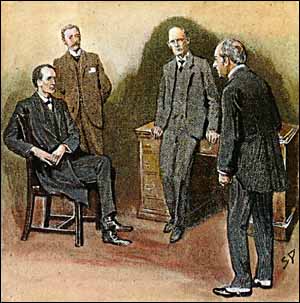He was a little, white-faced, clean-shaven, grizzly-haired fellow of fifty. He was still suffering from this sudden disturbance of the quiet routine of his life. His plump face was twitching with his nervousness, and his fingers could not keep still. | 彼は背が低く / 顔の白い / 綺麗に髭を剃った / 白髪混じりの50歳くらいの男だった◆彼はいまだに苦悩していた / 穏やかな日常生活を襲った突然の騒動によって◆彼の肉づきのよい顔は緊張に痙攣し / 指は震えていた |
“We are investigating this unhappy business, Bannister,” said his master. | 「私達はこの不幸な出来事を調査しているところだ、バニスター」 / 彼の主人が言った |
“Yes, sir.” | 「はい」 |
“I understand,” said Holmes, “that you left your key in the door?” | 「聞いたところでは」 / ホームズは言った / 「君は扉に鍵を刺したままにしていたんだな?」 |
“Yes, sir.” | 「はい」 |
“Was it not very extraordinary that you should do this on the very day when there were these papers inside?” | 「それはとんでもないことではないか / こういう書類が中にあるという日にそんなことをするとは?」 |
“It was most unfortunate, sir. But I have occasionally done the same thing at other times.” | 「本当に不幸な事でした◆しかし私は時々別の機会にも同じ事をしたことがあります」 |
“When did you enter the room?” | 「いつ、君は部屋に入ったのか?」 |
“It was about half-past four. That is Mr. Soames’ tea time.” | 「四時半ころでした◆ソームズさんのお茶の時間です」 |
“How long did you stay?” | 「どれくらいの間いたのか?」 |
“When I saw that he was absent, I withdrew at once.” | 「ソームズさんがいないのを見て / 私はすぐに下がりました」 |
“Did you look at these papers on the table?” | 「机の上の用紙を見たか?」 |
“No, sir – certainly not.” | 「いいえ / / もちろん見ていません」 |
 | |
“How came you to leave the key in the door?” | 「どうして鍵を扉に刺したままにするようなことになったのか?」 |
“I had the tea-tray in my hand. I thought I would come back for the key. Then I forgot.” | 「私はティートレイを手にしていました◆私は鍵を取りに戻ろうと思っていました◆その後忘れました」 |
“Has the outer door a spring lock?” | 「外側の扉にバネ錠はついているか?」 |
“No, sir.” | 「いいえ」 |
“Then it was open all the time?” | 「ではずっと開いていたわけだな?」 |
“Yes, sir.” | 「はい」 |
“Anyone in the room could get out?” | 「部屋の中に誰かがいれば出て来れたね?」 |
“Yes, sir.” | 「はい」 |
“When Mr. Soames returned and called for you, you were very much disturbed?” | 「ソームズさんが戻ってきて君を呼んだ時 / 君は非常に動転したとか?」 |
“Yes, sir. Such a thing has never happened during the many years that I have been here. I nearly fainted, sir.” | 「はい◆こんなことは一度も起きた事がありませんでした / 私がこちらに来てから長い年月が経ちますが◆私はほとんど卒倒しそうでした」 |
“So I understand. Where were you when you began to feel bad?” | 「そう聞いた◆気分が悪くなり出した時どこにいた?」 |
“Where was I, sir? Why, here, near the door.” | 「私がどこにいたかですか? / さあ / ここです / 扉の近くです」 |
“That is singular, because you sat down in that chair over yonder near the corner. Why did you pass these other chairs?” | 「それは変だな / 君はその隅にあるあの椅子に座ったんだろう◆なぜこちらの別の椅子を通り過ぎたんだ?」 |
“I don’t know, sir, it didn’t matter to me where I sat.” | 「分かりません / どこに座るかは私には問題ではありませんでした」 |
“I really don’t think he knew much about it, Mr. Holmes. He was looking very bad – quite ghastly.” | 「実際、彼はそのことについてあまり覚えていないと思いますよ / ホームズさん◆彼は非常に具合が悪そうでした / / ものすごく青ざめていました」 |
“You stayed here when your master left?” | 「君の主人が出て行った時、君はここにいたんだな?」 |
“Only for a minute or so. Then I locked the door and went to my room.” | 「一分かそこらだけです◆それから私は扉に鍵をかけ自分の部屋に行きました」 |
“Whom do you suspect?” | 「君は誰が怪しいと思う?」 |
“Oh, I would not venture to say, sir. I don’t believe there is any gentleman in this university who is capable of profiting by such an action. No, sir, I’ll not believe it.” | 「ああ / あえて申し上げようとは思いません◆この大学にそんな人物がいるとは信じられません / こんな手段で利益をあげようとできる◆いいえ / 私には信じられません」 |
“Thank you, that will do,” said Holmes. “Oh, one more word. You have not mentioned to any of the three gentlemen whom you attend that anything is amiss?” | 「ありがとう / もう結構だ」 / ホームズは言った◆「いや / もう一つあった◆君が世話をしている三人の学生には何も言っていないな / 何か不都合があったということは?」 |
“No, sir – not a word.” | 「いいえ / / 一言も言っていません」 |
“You haven’t seen any of them?” | 「誰にも会っていないな?」 |
“No, sir.” | 「はい」 |
“Very good. Now, Mr. Soames, we will take a walk in the quadrangle, if you please.” | 「結構◆さあ / ソームズさん / よければ中庭をちょっと散歩しましょう」 |